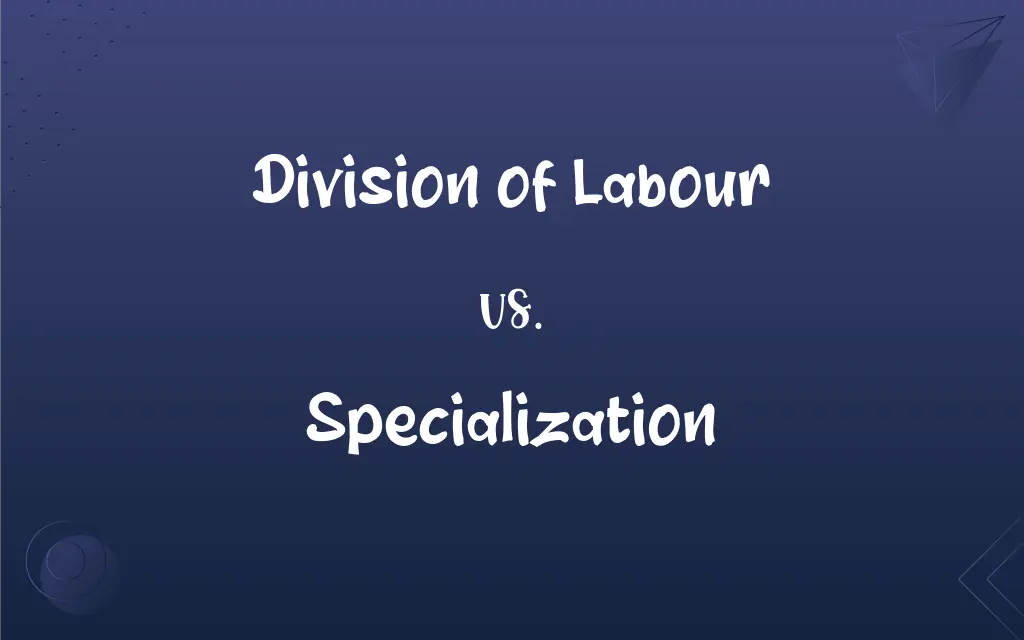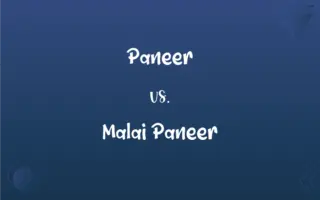Division of Labour vs. Specialization: What's the Difference?
Edited by Aimie Carlson || By Janet White || Published on March 11, 2024
Division of labour refers to the separation of tasks in a process, while specialization involves focusing on a specific area of expertise.

Key Differences
Division of labour is the process of dividing a complex task into smaller, more manageable parts, each performed by different workers. Specialization, on the other hand, involves individuals or entities focusing on a specific area of expertise or skill, often leading to increased efficiency and productivity.
In the context of division of labour, tasks are allocated to individuals or groups based on their abilities and resources, promoting efficiency in production. Specialization, however, requires individuals or organizations to develop expertise in a particular field, which can lead to innovation and improvements in quality.
Division of labour can lead to interdependence among workers or departments, as each relies on the others to complete different parts of a task. Specialization, while enhancing expertise in a specific area, can also result in a lack of versatility and adaptability.
The concept of division of labour is often associated with industrial processes and large-scale production, where tasks are segmented to increase output. Specialization, however, is not limited to production and can be applied to various fields, including education, healthcare, and technology.
Both division of labour and specialization are crucial for economic growth and development. Division of labour allows for the efficient allocation of resources and specialization leads to advancements in technology and knowledge, driving innovation and progress.
ADVERTISEMENT
Comparison Chart
Focus
Separating tasks in a process
Concentrating on a specific area of expertise
Scope
Can be applied to a single process or organization
Applies to individual or organizational level
Outcome
Increases efficiency in production
Leads to expertise and innovation
Adaptability
May lead to dependence on others
Can result in a lack of versatility
Application
Common in industrial processes
Broad, includes fields like education and technology
ADVERTISEMENT
Division of Labour and Specialization Definitions
Division of Labour
The allocation of different parts of a manufacturing process or task to different people to improve efficiency.
The assembly line is a classic example of division of labour, where each worker specializes in one part of the production process.
Specialization
The focus on a narrow area of knowledge or skill within a profession or field.
A tax accountant specializes in tax laws and regulations, providing valuable advice for financial planning.
Division of Labour
The breakdown of a job into smaller tasks, each performed by a separate individual or group.
In a restaurant, the division of labour is evident as chefs cook, waiters serve, and dishwashers clean.
Specialization
The process of concentrating on and becoming an expert in a particular subject or skill.
A cardiologist specializes in heart health, offering expert care for heart-related issues.
Division of Labour
The distribution of responsibilities among members of a group to increase productivity.
In a software development team, the division of labour ensures that coders, designers, and testers each focus on their specific tasks.
Specialization
The development of expertise in a specific area of work or study.
A software engineer specializes in coding and software development, creating efficient and innovative applications.
Division of Labour
The organization of work into distinct roles to optimize performance.
In a hospital, the division of labour is crucial, with doctors diagnosing, nurses caring for patients, and technicians handling equipment.
Specialization
The practice of dedicating oneself to a specific aspect of a job or field.
A wildlife photographer specializes in capturing images of animals in their natural habitats, showcasing their beauty and behavior.
Division of Labour
The separation of a work process into distinct tasks performed by different workers.
In a car factory, the division of labour allows one worker to install engines while another paints the car bodies.
Specialization
The act of refining skills and knowledge in a particular area to achieve expertise.
A pastry chef specializes in baking and decorating cakes and pastries, creating delicious and visually appealing desserts.
Specialization
The act of specializing or the process of becoming specialized.
Specialization
Adaptation, as of an organ or a species, to a specific function or environment.
FAQs
What is specialization?
Specialization is the process of focusing on and becoming an expert in a particular subject or skill.
How does division of labour improve efficiency?
Division of labour improves efficiency by allowing workers to focus on specific tasks, reducing the time and effort required for task switching.
What is division of labour?
Division of labour is the separation of a work process into distinct tasks performed by different workers.
Is division of labour applicable only to manufacturing processes?
No, division of labour can be applied to various fields, including services, healthcare, and technology.
Can specialization be applied to organizations as well as individuals?
Yes, specialization can be applied at both the individual and organizational levels.
What are the benefits of specialization?
Specialization leads to increased expertise, innovation, and improvements in quality within a specific area.
Can division of labour lead to dependency among workers?
Yes, division of labour can lead to interdependence among workers, as each relies on others to complete different parts of a task.
What is an example of specialization in a professional context?
An example of specialization is a lawyer focusing exclusively on environmental law.
How does division of labour affect productivity?
Division of labour can significantly increase productivity by streamlining processes and reducing redundancies.
Is division of labour beneficial in all scenarios?
While generally beneficial, division of labour may not be suitable for tasks requiring a high degree of creativity or flexibility.
How does specialization affect adaptability?
While specialization enhances expertise, it can also result in a lack of versatility and adaptability in other areas.
What is an example of division of labour in everyday life?
In a household, division of labour might involve one person cooking, another cleaning, and another managing finances.
How does specialization contribute to economic growth?
Specialization contributes to economic growth by fostering innovation, improving quality, and increasing efficiency in specific sectors.
What is the relationship between division of labour and specialization?
Division of labour and specialization are related concepts, with division of labour facilitating specialization by dividing tasks, allowing individuals to focus on specific areas of expertise.
What role does technology play in division of labour?
Technology plays a crucial role in division of labour by automating tasks and allowing for more efficient allocation of human resources.
How do division of labour and specialization impact the structure of organizations?
Division of labour and specialization impact the structure of organizations by defining roles, responsibilities, and hierarchies, leading to more efficient and focused operations.
Can specialization lead to a narrow focus?
Yes, specialization can lead to a narrow focus, which might limit exposure to broader perspectives and opportunities.
Can division of labour lead to monotony for workers?
Yes, division of labour can lead to monotony and dissatisfaction for workers if they are confined to repetitive tasks.
How does specialization affect competition in the market?
Specialization can intensify competition by encouraging businesses to excel in specific niches, leading to higher quality and innovation.
Can specialization limit career flexibility?
Yes, specialization can limit career flexibility, as individuals may find it challenging to transition to different areas outside their expertise.
About Author
Written by
Janet WhiteJanet White has been an esteemed writer and blogger for Difference Wiki. Holding a Master's degree in Science and Medical Journalism from the prestigious Boston University, she has consistently demonstrated her expertise and passion for her field. When she's not immersed in her work, Janet relishes her time exercising, delving into a good book, and cherishing moments with friends and family.
Edited by
Aimie CarlsonAimie Carlson, holding a master's degree in English literature, is a fervent English language enthusiast. She lends her writing talents to Difference Wiki, a prominent website that specializes in comparisons, offering readers insightful analyses that both captivate and inform.
































































